|
|
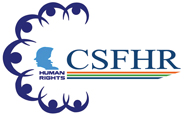 |
Civil Society Forum on Human Rights |
| CSFHR e-Newsletter |
| VOLUME II ISSUE -1 SEPTEMBER-OCTOBER, 2016 |
|
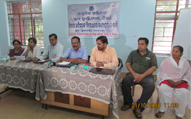 |
|
|
|
| |
|
| |
Dear Readers,
We are pleased to bring out another issue of CSFHR’s electronic news letter. This issue will familiarize you with the regular features and activities of the last two months.
Friends, you may be knowing, a BJP leader and a former Rajya Sabha MP works as party in charge of Jammu & Kashmir, is likely to be appointed as NHRC member in the next few days. This has created grave discontents among people – particularly among members of the human rights fraternity in the country. Human rights activists from non-governmental organizations questioned the government’s decision to appoint an active politician to the NHRC and already a Memorandum has been submitted to the President of India. Appointments is a crucial issue that affects the overall functioning of any national human rights institution (NHRI), especially due to the advocacy and monitoring roles of the NHRIs, vis-à-vis the government in question. On principle, nomination by the government is likely to jeopardize the independence of the Commission. It will send a wrong message and decrease the public faith in these institutions.
Political appointments directly contradict the UN Paris Principles that provides the guidelines for the appointment in the National Human rights Institutions. Therefore, there arises a need to protect such institutions from being silenced by their governments, and to provide guidelines for their independent and efficient functioning. We demand for transparent and impartial appointments of those having experience and knowledge of Human rights only.
We are also requesting our readers to join us in protesting such political appointments.
We wish our readers a happy reading!
CSFHR Team
|
| |
|
|
| |
|
| |
Newborn dies in absence of doctors in Odisha hospital
A three-day-old child died in Jagatsinghpur District Headquarters Hospital (DHH) for want of medical attention on dated 10th September, Saturday. Sources said Swagatika Mohanty of Chadeigaon was admitted in the DHH for delivery on Thursday. She delivered a male child and a few hours later, the mother and child were discharged by a doctor allegedly without examining the child’s condition. The child got choked during feeding.
See more
3000 infants died in Odisha’s Kandhamal in 5 years
The infant mortality rate (IMR) is alarmingly high in Odisha’s Kandhamal district as around 3,000 infants died in the district in the last 5 years due to malnutrition and lack of awareness programmes. As per Government data, as many as 555 newborns died in 2011-12. While 80 infants died in Daringibadi block, 77 died in Phiringia block. Notably, G Udayagiri registered nil infant deaths during that year. Similarly, 547 infants died in 2012-13 here out of which highest 95 infants’ deaths were reported in Daringibadi and 80 in Phiringia.
See more
Woman deprived of housing aid in Ganjam village
Despite implementation of several schemes to provide houses to poor families, many in Ganjam district are deprived of the benefits due to red-tapism. Khali Nayak (54) of Kumbhar Street at Jagannathprasad in Ganjam is one such woman who has been deprived of the welfare scheme. The woman has been living alone in her single-room thatched house ever since the death of her husband. During Phailin in 2013, her house was damaged. Despite her several attempts to seek Government assistance to repair her house, no help was forthcoming.
See more
Pregnant woman dies as 108 fails to reach
A pregnant woman of Aliganda village under Mohona block in Gajapati district died on 27th September, Tuesday due to non-availability of ambulance. The seven-month-pregnant, Sunita Sabhapati (28), felt labor pain and had to be admitted to the hospital. However, despite several attempts, the 108 ambulance could not be reached. The family members then carried Sunita in an auto-rickshaw to Mohona hospital. On the way, the auto-rickshaw overturned near Badanala Chowk and Sunita sustained severe injuries. Sunita succumbed to her injuries in the hospital.
See more
Husband carries pregnant wife on shoulder as ambulance reaches two hours late
Another incident of apathy was reported from Rayagada district in Odisha on Tuesday where a man had to carry his pregnant wife on his shoulder as the ambulance failed to reach on time. The woman from Kansharikhala village in Odisha complained of acute stomach pain. Seeing her condition, ASHA and anganwadi workers called for 108 services asking for an ambulance. Even after repeated calls, the vehicle reached after two hours. Seeing her condition getting worse, her husband took her on his shoulder and walked one km to a road point near Kesabuniguda. It was here where the ambulance ferried her to the hospital which was about four km away.
See more
Water Tank Collapses; Woman and Daughter Killed
In a tragic incident, a woman and her daughter were killed as a water tank near which they were working collapsed at Telimunda Sahi of Tumudibandha village in Kandhamal district on 24th September, Saturday morning. The deceased were identified as Bharati Dalapati and her daughter Jangyaseni.
See more
‘Witch-hunt' continues in state, 5 killed in 2 weeks
Cases of witch-hunt continue across the state despite the state government claims of initiating steps to curb the menace. In the month of September only, five persons have been killed in Odisha. Police has detained eight persons for their alleged involvement in killing three members of a family of Kitung village in Rayagada district on September 9, suspecting them to be sorcerers. The tribal Arjun Sabar, his wife and daughter were killed without any reason.
See more
Man dies, 25 hospitalised after consuming contaminated water in Jatni
One person was killed and 25 others were admitted at a hospital reportedly after consuming water from a well in Rathipur village under Jatni police limits in Khurda district on Tuesday. The deceased was identified as Bhaskar Bhoi. As usual they used the water of the same well for various purposes, including drinking purpose on Tuesday. However, after drinking water some villagers complained of stomach and chest pain on Tuesday morning. After a while one Bhaskar Bhoi died. The villagers demanded immediate alternative arrangements to solve the drinking water facility in their locality.
See more
|
| NHRIs/SHRIs in News |
| |
NHRC notice to the Government of Odisha over reported fire in a Bhubaneswar hospital resulting in death of 29 persons
The National Human Rights Commission has taken suo motu cognizance of media reports that due to suspected short circuit; a major fire broke out in the SUM Hospital and Medical College in Bhubaneswar, on the 17th October, 2016. At least 30 persons were reported dead. 40 patients in a critical condition were admitted to different hospitals. Reportedly, the hospital in question was warned as early as in 2013 for not keeping the safety measures but the hospital authorities ignored it. In Odisha, out of 568 hospitals, only 3 have clearance of the department of fire safety.
See more
NHRC notice to the District Collector, Malkangiri and the Secretary, Department of Health & Family Welfare, Government of Odisha over spreading of Japanese Encephalitis in the district
The National Human Rights Commission has taken suo motu cognizance of a media report that many children have died in Malkangiri district, due to "Japanese Encephalitis", which has spread in several villages in district Malkangiri of Odisha. Reportedly, the Encephalitis virus develops in the pigs and is transmitted by mosquitoes to humans. Allegedly, the social workers and the district authorities are of the opinion that culling of pigs is not possible and the only solution is vaccination of the children, which would be done from next year.
See more
NHRC sends notice to government regarding compensation to Lili Naik's kin
The National Human Rights Commission (NHRC) has issued show cause notice to State Government asking why compensation of `50,000 each should not be paid to Lili Naik, her brother Sudam Si and husband Sukadev Naik for violation of their human rights by police. Lili (26), a native of Dhadasahi village under Morada police limits in Mayurbhanj district, was declared ‘dead’ by police while her husband and younger brother were arrested on charges of killing her in 2012
See more
Suicide in police custody: OHRC orders Govt for Rs 4 lakhs compensation to deceased’s kin
The Odisha Human Rights Commission (OHRC) has directed the State Government to give a compensation of Rs 4 lakh to the kin of Goutam Bag, a native of Kantabanjhi in Bolangir district, who was found dead in police custody under suspicious circumstances last year. OHRC acting Chairperson Justice BK Mishra directed the Home Department to pay the compensation to Bag’s family and report compliance within two months.
See more
Nagada malnutrition deaths: High Court sent notices to Centre, State
The State High Court on Monday issued notice to the Central and State Government in connection with the malnutrition deaths in Nagada of Jajpur district. Nagada had been the centre of attraction after the deaths of 19 children, due to malnutrition, was reported two months back. Representatives of various parties along with leaders of State and Central Government visited the area to check the condition of the people. Central and State level departments also initiated various steps to check further malnutrition deaths in the area.
See more
NHRC Asks Railways to Clarify Timeline for Attaching Toilets in All Trains
The National Human Rights Commission (NHRC) has asked the Indian Railways authorities to clarify the time period within which all the trains would have the required toilet facilities for all the passengers. The Commission has directed the Chairman of Railway Board to submit its reports on the matter within six weeks. Last year, Odisha based rights activist Akhand had filed a petition before the Commission that hundreds of trains were running in the country without toilet facilities.
See more
NCPCR seeks report on Nayagarh botched blood transfusion
The National Commission for Protection of Child Rights (NCPCR) has directed collector of Nayagarh to submit detail report on the alleged incident pertaining to transfusion of infected blood to six Thalassemia affected children in the district in September.
See more
Rights Panel sought report on 'unsafe' cyclone shelters in Odisha
The Odisha Human Rights Commission (OHRC) has ordered for an inquiry into the allegation of dilapidated condition cyclone shelters across the state. The commission has directed Secretary of Revenue and Disaster Management Department and Special relief Commissioner to file a detailed report in the matter.
The order of the state rights panel has come on a complaint filed by rights activist Akhand in the matter.
See more
|
| |
| Important Judgements/ Orders/ Observations |
| |
In a first, NHRC prepares for a political appointee
BJP vice-president Avinash Rai Khanna is likely to be appointed as NHRC member in the next few days. Khanna, the party leader in charge of Jammu & Kashmir, was a member of the Rajya Sabha till April this year. This is the first time an active politician is being appointed to the post, which has remained vacant for over two years now.
See more
Supreme Court seeks reply from Centre, states on gau rakshaks in four weeks
The Supreme Court on Monday granted four more weeks to the Centre and six states to file replies on a plea seeking action against so-called cow vigilantes who were allegedly committing atrocities against Dalits and minorities.
The centre and the states of Gujarat, Maharashtra, Uttar Pradesh, Karnataka, Rajasthan and Jharkhand have to file their replies to a plea filed by Congress leader Tehseen S Poonawalla, which also sought action against these ‘gau-rakshaks’.
See more
Triple talaq & polygamy ruin lives: National Commission for Women tells Supreme Court
The NCW is partaking of a large number of cases relating to women who have been at the receiving end of the practice of unilateral talaq. Triple talaq (talaq-e-bidat), nikah halala and polygamy are unconstitutional because they compromise the rights of Muslim women (or women who marry into Muslim community) to their disadvantage, which is detrimental to them and their children," the NCW said.
See more
|
|
|
Tankadhar Bhatra, a tribal youth of Goramba village under the Nabarangpur district, was suspected to have been sacrificed in the house of one Bankim Ray in the village. However, the police took confession from one Raju Mandol of killing the tribal youth. Although the deceased’s family members filed a complaint with the police that they were suspecting it to be an incident of human sacrifice, the investigating officers did not pay any heed to their account. When both the deceased’s wife and the mother of the accused are urging for an impartial probe into the incident, the police tried to give it a different color.
|
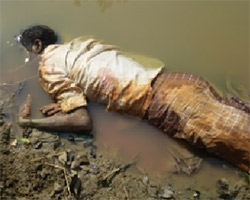
|
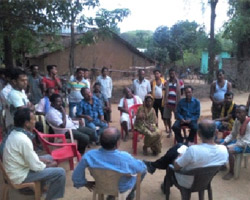
|
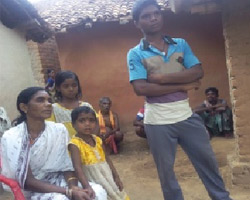
|
| Tankadhar Bhatra |
Team interacting with villagers |
Wife, Daughter and Son of Victim Tankadhar |
|
| |
|
A fact finding team comprising of Bibekananda Das, senior Journalist; Akhand, Human rights defender and Tapan Padhi, all from CSFHR went to Umarkot, Nabarangpur on 17th May 2016. The team visited the place, interacted with family of the victim, witnesses to some factual happenings, villagers, accused and suspected persons.
Findings of the Fact Finding Team:
- Umarkote police violated all the investigation procedures. Police even did not come to any one’s house to take statements.
- IIC Umarkote illegally detained all the accused more than 24 hours of arrest and applied third degree to all of the arrestees.
- Driver Bankim Mandal forcefully beat all the accused in police custody, coerced and threatened under gun point to accused to accept the crime.
- Police was and is careless to accept people’s demand of investigation at the angle of sacrificing Tankadhar
- Complainant and some witnesses discussed the matter with SP Nabarangpur and DIG too, gave their statements but none of them recorded by the police.
- Role of IIC and driver Banki Mandal was very suspicious in whole of the investigation.
- IIC Umarkote threatened the witnesses to lock them up if they give their statement anywhere.
- Names of many suspects( Bankim ray, Gobinda Ray, Tushar Ray, Subodh (uncle of Bankim) and others who are involved in such human sacrifice are being revealed by many witnesses but police knowingly did not register their complaints.
- The doctor in charge of post mortem manipulated the post mortem report and it is clearly evident that the killing was not a mere murder but was a well and preplanned human sacrifice before any deity.
Demands of the team:
- Crime branch level fresh investigation to unearth the motive of murder ( human sacrifice) and bring the real criminals before Court of Law.
- Investigate the black money source and smuggling marijuana of Bankim Ray and his brother Gobinda Ray
- Judicial and criminal proceedings against Bankim Ray, Asst teacher, government school
- File a fresh FIR against the real culprits.
- Provide compensation of Rs10 lakh to the victim’s family immediate after lodging the case
|
| |
|
| |
|
The Odisha Human Rights Commission (OHRC) has issued a notice to the Women and Child Development department of the state to submit a report about lack of toilets in Anganwadi Centres (AWCs). The commission passed this order on October 3, 2016, after hearing a petition filed by human rights campaigner Akhand. He had originally filed the petition before the National Human Rights Commission (NHRC) on November 5 last year, but it was later forwarded to the OHRC.
See more
|
|
| |
| Sum Hospital Fire: Civil Society demands action against erring Officials |
| |
A Civil Society Meeting on Sum Hospital fire was held on 21st October 2016, in Bhubaneswar. The fire incident, which happened on Monday, 17th October, took the lives of thirty persons, injuring more than fifty who were admitted in different hospitals in the capital city. The activists and human rights defenders who gathered in the meeting have raised several questions on the role of Government officials responsible to inspect/review/monitor or to issue/renew/reject licenses/certificates on the adherence to safety related Acts/rules/Guidelines that led to the fire.
The State Government has amended the Odisha Clinical Establishments (Control and Regulation) Act, 1991 to strengthen the licensing authority with provisions of entry, inspection and compliance for such institutions in 2015 and as per amendment, maintaining Fire safety and life safety standards have been made mandatory for clinical establishments. The activists in the meeting stated that the SUM hospital had not obtained a NOC (No-Objection Certificate) from the fire department.
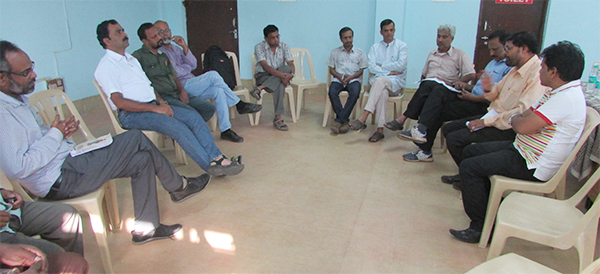
Since 17th November 2014 Sum hospital has been empanelled under Central Government Health Scheme (CGHS), question arises how did the government empanel a hospital without required license and safety measures? And why didn't the Hospital keep up to safety standards although it was reportedly warned in 2013?
Some of the other questions raised were –
- Why no action has been initiated against Khurdha CDMO?
- In the state, only three have clearance from the state's Department of Fire Safety.
- What steps/precautions have been taken or are recommended to the Fire Safety Director Office, Government of Odisha, to prevent recurrence of such mishaps?
- Why the safety standards, rules and regulations are not executed properly, why the governmental officials/bodies (duty bearers) responsible for inspection & monitoring and issuing of licenses/NOC are not able to prevent the Hospitals from flouting laws & committing crimes?
It was also discussed that a three-member task force committee was formed at the district level in which the district collector is the chairman while the Superintendent of Police and the CDMO are the two other members. The task force committee is supposed to meet at regular intervals and verify the registration of the private clinics and renew their certificates. It recommends the state government for registration of new clinics after verifying their credentials. But this mechanism totally failed in the state. Besides there are several regulations and guidelines mentioned in the National Disaster Management Guidelines and National Building code laid out by the Government of India for the safety of the hospital which was also violated.
“The officials, who did not perform their mandated duties, must be held responsible for their omissions and commissions that led to the irreparable loss of innocent lives”- the activists demanded.
Some important decisions taken in the meeting:
1) Evidence of intentional negligence and conspiracy to save the Hospital by the monitoring authorities will be done through RTI.
2) Memorandum to Governor will be submitted.
3) FIR against public authorities responsible for such mishap will be lodged.
4) Demand that regular Monitoring of clinical establishment must be done to ensure that they follow all the norms and guidelines.
Immediate Demands:
- File FIRs against responsible government officials who failed to take necessary steps against violation of rules and norms of fire safety in Sum Hospital.
- Arrest all the persons directly or indirectly responsible for the deaths and damages because of fire-breakouts.
- Provide Rs. 20 lakhs as minimum compensation to the relative of the persons (to each) who lost their lives as a result of fire-breakout in Sum Hospital and Rs.5 lakh each to the severely injured.
Long term Demands:
- The state government should implement fire safety measures strictly in all the hospitals and Nursing homes.
- A Hospital Disaster Management Plan (HDMP) and frequent ICU & ward evacuation drills are deemed necessary amidst several other safety measures. The HDMP, formed by a set Disaster Management Committee of the hospital is also required to design floor maps, pointing at the designated exit ways for smooth evacuation in case of a mishap. Every hospital must not just have adequate resources like fire extinguishers and pre-stored water supply, but must also conduct regular training of hospital staff about evacuation procedures for patients.
- Regular monitoring of the hospitals should be undertaken and strict action should be taken by the appropriate authority.
- All clinics and hospitals must be register under Clinical Establishments Act, 2010
- Citizen charter should be (mentioning all safety measure) displayed in all the hospitals and nursing homes.
- All the clinics should have evacuation/rapid response team and medical emergency/cardiac arrest", in place to operate immediately in times of crisis.
- State should design disaster preparedness program and implement it in partnership Urban Local Bodies, Critical Public Service Institutions and Community groups.
- Hospital safety initiatives should be integrated with the health programs.
- Safety measure audits should be made mandatory for all hospital.
|
|
| |
To be equal before the law
By: Suhrith Parthasarathy, Advocate, Madras High Court
|
On June 30, following a seminal vote, the United Nations Human Rights Council passed a resolution creating a post of an independent expert on sexual orientation and gender identity. This expert, once officially appointed, will be tasked with the job of studying and reporting annually on the nature, the cause, and the extent of discrimination faced by lesbian, gay, bisexual and transgender (LGBT) persons around the world. In many ways, the establishment of the new post exemplifies a growing global trend towards addressing the egregious human rights violations suffered by LGBT persons. But to us, in India, it must come as a matter of grave shame that our country, in an act utterly unbecoming of a modern progressive state, chose to abstain from voting altogether to appoint the expert.
Disingenuous explanation
At Geneva, India offered no official reasons for its abstention. Vikas Swarup, the spokesperson for the Ministry of External Affairs, however, had this to say later: “As you know, the issue of LGBT rights in India is a matter being considered by the Supreme Court under a batch of curative petitions filed by various institutions and organisations… As you also know, the Supreme Court is yet to pronounce on this issue. As such we had to take this into account in terms of our vote on the third UN resolution to institutionalise the office of an independent expert to prevent discrimination against LGBT persons.” This purported justification, though, is somewhat disingenuous, and it presents to us the hidebound nature of our Republic’s institutional machinery.
It is no doubt true that the Supreme Court is presently seized of cases challenging the constitutionality of the law that criminalises homosexuality. But, it’s also worth bearing in mind that this fact, that the issue is sub judice, has scarcely stopped India from voting to embrace a series of amendments that weaken the larger resolution adopted to appoint an independent expert. One of these amendments that were introduced by Pakistan, on behalf of the Organisation of Islamic Cooperation, and that was adopted after India voted in its favour, explicitly states that the expert’s mission would ensure, at all costs, respect for the sovereign right of every country to implement its own national laws — in India’s case, this is a direct reference to Section 377 of the Indian Penal Code, which makes even consensual homosexual activity a crime. Therefore, any report of the newly appointed expert would have to give sufficient weight to the fact that India’s laws proscribe, and even criminalise, homosexuality.
A long history
When viewed in this light, it’s clear that India’s abstention in the principal vote to appoint the expert is anything but a display of neutrality. This decision was neither a product of indecisiveness nor does it signify any expression of disinterest on the subject; on the contrary, it must be viewed as a subtle act of deception aimed at furthering the reach of a law that is decidedly iniquitous, that cruelly denies to several persons their basic human dignity, and that impinges on the rights of a sizeable slice of the populace from participating fully in the make-up of our country’s moral bedrock.
In July 2009, the Delhi High Court, recognising the inherent injustice in Section 377’s operation, rendered a momentous verdict, and found that the law, in persecuting a community purely based on the sexual orientation of its members, was patently opposed to the Constitution’s essential promises. However, just over four years later, in Suresh Kumar Koushal v. Naz Foundation, the Supreme Court reversed this finding. Here, a bench of two judges, through a judgment delivered by Justice G.S. Singhvi, doggedly refused to see the LGBT community as equal partners in our citizenry. Instead, the court restored Section 377 to its archaic ingloriousness, granting validity, in the process, to the state’s ability to criminalise acts based on perceived moral grounds, notwithstanding the effect that such laws might have on the fundamental right of a person to be treated with equal concern, and of the right that such persons have to be allowed to freely make ethical choices on how they seek to live their lives.
Section 377, plainly read, punishes with imprisonment for life or for a term of up to 10 years any person who voluntarily has “carnal intercourse against the order of nature with any man, woman or animal”. At its core, therefore, is an intention to enforce a decree against actions that are professed to be beyond the warrants of society’s moral compass. Only, that in the case of criminalising homosexuality, it is the outlawing of the act that is immoral, and not the act itself. This fundamental iniquity in Section 377 is, in fact, evident even from the notes of its drafter Lord Macaulay, who had specifically aimed to enforce Victorian morality through the criminal justice system. “We are unwilling to insert, either in the text, or in the notes, any thing which could give rise to public discussion on this revolting subject,” Macaulay wrote in his chapter on “unnatural offences”. “…We are decidedly of the opinion that the injury which would be done to the morals of the community by such discussion would far more than compensate for any benefits which might be derived from legislative measures framed with the greatest precision.”
As the American philosopher Martha Nussbaum has argued, the Supreme Court’s verdict in Koushal shows us that there is an almost pathological emotion of disgust at the heart of any perceived rationale for criminalising homosexuality, when such acts cause no actual harm to any person whatsoever. It is undeniable that a society’s moral judgment must play some role in determining the extent of its criminal laws. However, “a conscientious legislator who is told a moral consensus exists,” as the legal philosopher Ronald Dworkin once wrote, “must test the credentials of that consensus.” The community’s moral standards thus cannot be arbitrarily gleaned nor can it be a product simply of inexplicable revulsion and disgust. In the case of Section 377, any reasonable analysis would show us that to regard homosexual activity as somehow immoral violates the innate natural autonomy that every person has over his or her respective sexuality. Justice Singhvi’s judgment is predicated on a bizarre belief that the only point of a democracy is to accept the majority’s verdict. But, as is evident from any sensible reading of the Constitution, democracy demands something more than the enforcement of the popular will. It requires a commitment, among other things, to our bill of rights, specifically to Part III of the Constitution.
Although the Supreme Court has already once refused to review its judgment in Koushal, in February this year it agreed to list a batch of curative petitions — which question the correctness of its decision — before a Constitution Bench of five judges or more. Now, with the curative petitions still left undecided, a group of five individuals has once again approached the Supreme Court questioning the law’s validity. On the face of it, the timing of this new challenge might appear curious, given the pendency of the curative petitions. But regardless of any concerns over strategy, the issue’s implications remain gravely significant. After all, the questions raised in the new petition concern individuals who have each been treated as an outcast by a society that purports to be equal.
A rise in homophobia
What’s more, since the judgment in Koushal, there has been a rise not only in homophobia but also in instances of an abuse of the process of the law contained in Section 377. Simultaneously, there have been repeated efforts made by the present ruling dispensation to further perpetuate the law’s deeply damaging effects. Among other developments, at least two private member’s bills moved in the Lok Sabha by Shashi Tharoor, which sought decriminalisation of homosexuality, were met with predictably wicked defeats. It is also worth considering that although the referral to a Constitution Bench of the curative petitions offers a glimmer of hope, the chances of their success, given the court’s usually guarded approach to such challenges, are terrifyingly slim. Viewed thus, the new petition questioning the validity of Section 377 — which was referred by a two-judge bench to the Chief Justice, for him to decide whether it could be heard in conjunction with the curative petitions — assumes particular significance.
Given the appalling consequences of the Supreme Court’s judgment in Koushal, here, therefore, is a fervent plea to the Chief Justice of India: it is imperative that a Bench of five judges or more is constituted as expeditiously as possible to rehear the challenge to Section 377, made by the clutch of petitioners both old and new. For, a failure to annul the Supreme Court’s verdict in Koushal would only perpetuate what is really a gross miscarriage of justice. Ultimately, the court’s legitimacy as a vital pillar of our democracy depends on its ability to nullify popular will when the decisions of the majority transgress the Constitution’s guarantees. By reversing Koushal, the court can help usher India into a more equal future, where the tyrannical belief of some does not deny to any person the right to be treated as an equal member of society, and the right to enjoy the Constitution’s foundational liberties. |
| |
| (Originally published in The Hindu, dated 9th July 2016) |
| |
|
| |
Please, subscribe to our latest news letter to be updated
 |
| |
| Disclaimer: CSFHR e- Newsletter is only for private circulation |
| |
|
|
|
|
| |
|
|
|